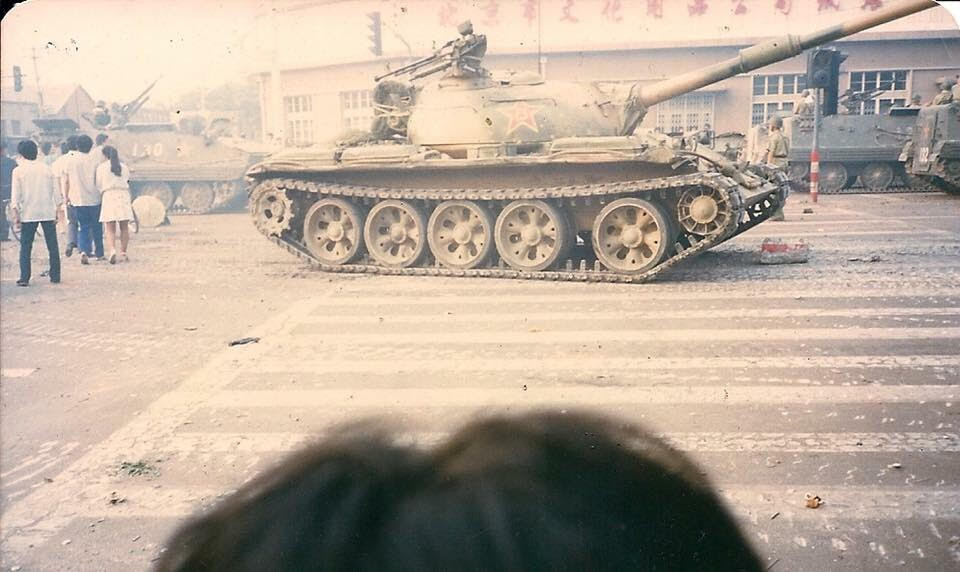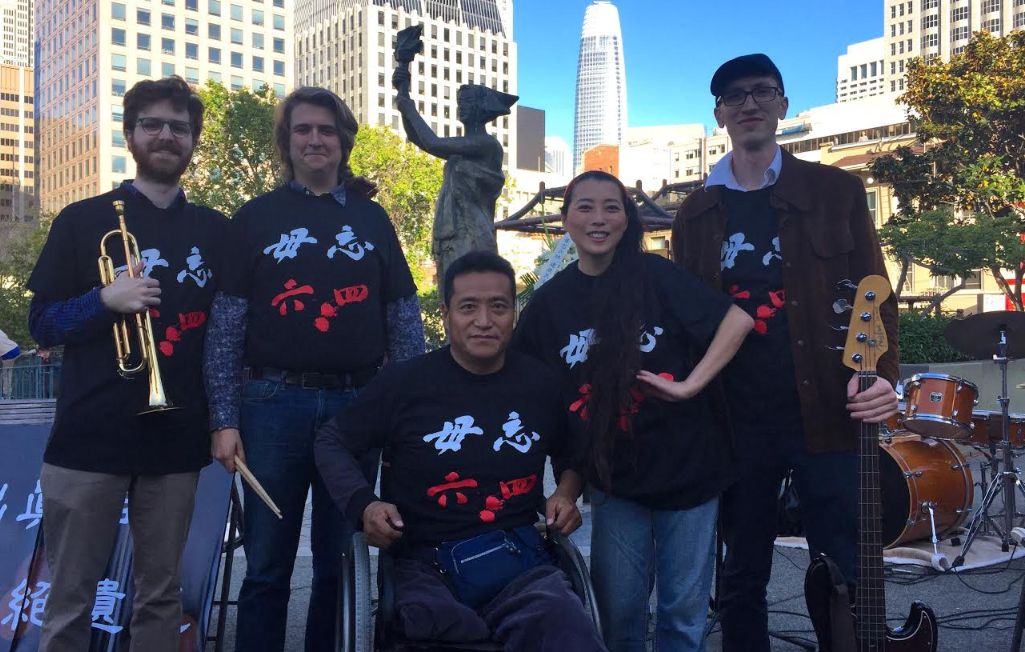On the way out of San Francisco airport, I warned fellow band member Evan Strauss to prepare for a historic moment, as my Tiananmen brother Fang Zheng pulled over in his minivan. He had invited us to travel from New York to perform at a candlelight vigil for the 29th anniversary of the Tiananmen Massacre.
Both of Fang’s legs were crushed by a tank as he was rescuing another student on June 4, 1989. About a dozen students walking with him after leaving Tiananmen Square were killed by tanks, on the Avenue of Eternal Peace.

I asked Fang to offer a Chinese name for our band, “On The Way”. “How about 行者 (Xingzhe) ?” He said. It’s the nickname of the rebellious Monkey King in “Journey to the West”, a Chinese novel from the 16th century. He explained: “It’s about a journey, to explore the truth…”
“Commemorating Tiananmen is a torch relay. The Chinese Communist Party has been trying to cover the sky and earth with their ‘red China’ propaganda. The world needs to know the truth about China,” he added. “Most Americans don’t know about June 4th. I invited these young Americans to learn about the real China, and express it through their music.”
In 1989, if we students could have watched the year 2018 unfold, we would have been shocked to see so many Western governments and corporations kowtowing to Beijing, apologizing for “hurting Chinese people’s feelings”. Not to mention the corruption of U.S. President Trump that’s more blatant than that of Chinese Communist Party leaders, and his family’s personal business dealings with China.
That was why I was surprised when 26-year-old drummer Nathan Repasz accepted without hesitation my invitation to form a band for the tour on the west coast. Two other musicians, Evan Strauss and Michael Beggs, both 29, soon joined us. All three Americans were born after Tiananmen but have learned about it in high school.

As I warned they might be banned by China, they said they’d be honoured. “There are few sacrifices as important as those made by people who put their bodies on the line in the face of state violence,” said Strauss, a mental health counsellor in a New York high school.
To Repasz, an activist since high school, commemorating Tiananmen is important because of “the danger of nationalism”.
While many Chinese students overseas impose their raucous nationalism on their host countries, some are quietly taking action against it. Sveta Lee, an undergraduate at the University of California, Berkeley, emceed the candlelight vigil in San Francisco on June 3.
Her mother told her about Tiananmen when she was in China, but she didn’t learn the details until accessing the uncensored internet when she went to study in Belarus, aged 16. She decided not to return to China.
Lee said: “I don’t want to see those young students around my age who bravely stood up for democracy and the rule of law constantly defamed by the Communist Party. That’s why we keep participating in the commemoration of June 4th each year until the day when the Party is officially charged with crimes against humanity. We do it for the people who died for democracy, and for ourselves, too.”

These youngsters are the latest I came across in my mission to raise the awareness of Tiananmen. High school students from Maryland and Los Angeles approached me for their documentaries or stage plays about Tiananmen.
The camaraderie against state violence has been greeting me wherever I travel over the last two decades. People welcome me with open arms when they know I’m a Tiananmen survivor, including a Belgian farmer who wept in front of his children while describing the Tiananmen coverage he watched as a 12-year-old, and a Chinese student in Florence who asked to hug me after I told her of June 4th.
The real legacy of Tiananmen is not the call for democracy or fight against corruption. It was the mini-utopia where everyone was a participant and had a say – everyone had a sense of responsibility for the community that’s the Square.
In marches and rallies, we sang songs from Hong Kong and Taiwan, and even the Internationale. Cui Jian, the Father of Chinese rock, performed in the square for students whose rebellious traits had already been cultivated by rock, folk, and pop music from the West by then. Tiananmen was a big party against the Party, China’s Woodstock without mud but with plenty of blood.
Singing Cui’s song “Last Gunshot” took us back to the square. As we also performed Chinese folk with improvised jazz, the activists, Tiananmen survivors, and family members of political prisoners in the audience may not realize Free Jazz itself has long been associated with political protests.
We were all born with microphones in our mouths and swords in our hands. The world is a theatre of absurdity. The stage, ours. We should all play.
